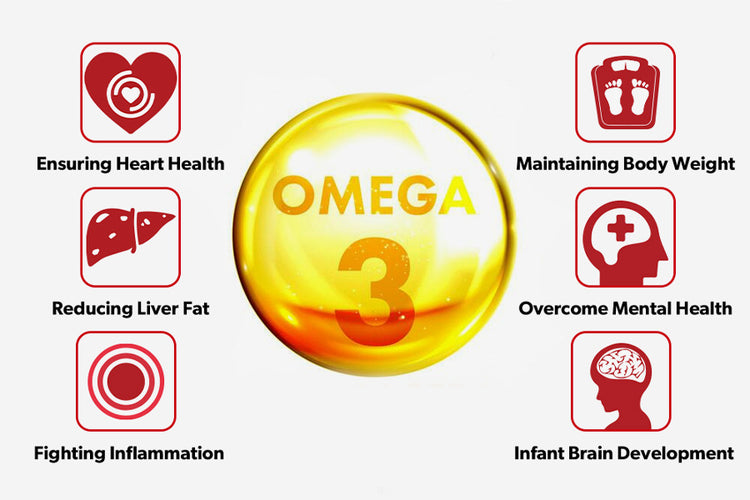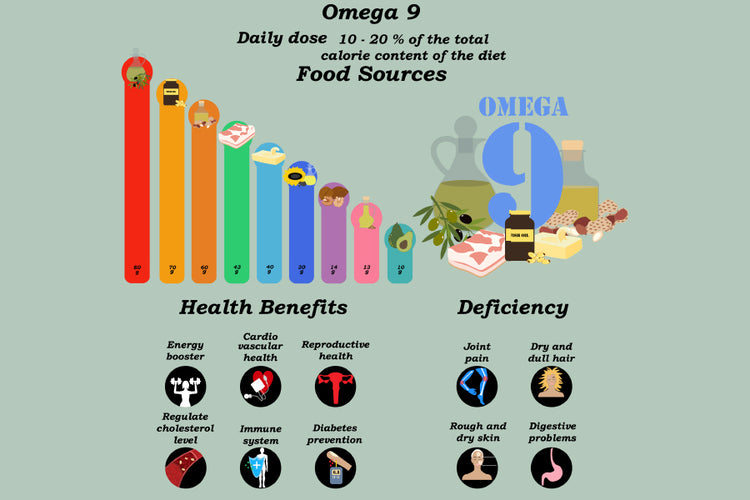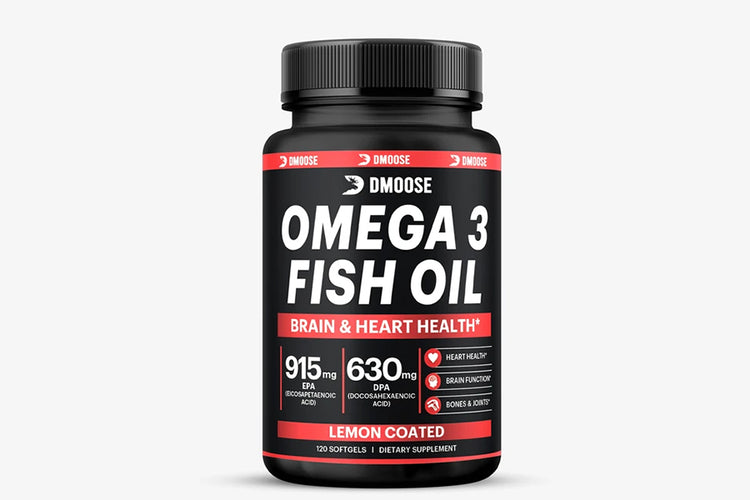As we strive towards leading a healthier lifestyle, we often come across terms such as Omega-3, Omega-6, and Omega-9. While all of them are significant sources of various health benefits, some researchers believe that Omega-3 might be the most important. However, others suggest that consuming a balanced ratio of Omega-3, Omega-6, and Omega-9 could be the key to a healthier heart, brain, and joints.
Omega 3, omega-6, and omega-9 are essential fatty acids with immense health benefits. However, the benefits of consuming these essential dietary fats rely on maintaining a healthy balance between them. An imbalance of dietary fats can even result in chronic diseases.
So, what do the experts say? Well, there's no one-size-fits-all answer. It largely depends on individual requirements and health conditions. That said, it's always good to understand these essential fatty acids to make an informed decision.
This article refers to the omega-3-6-9 benefits, their food sources, and the role of omega-3-6-9 supplements. As omega-3 is considered the most significant among all three, let's explore more about omega-3 fatty acids in the next section.
Related Article: 11 Evidence-Based Benefits of Omega-3 Fish Oil
What Are Omega-3 Fatty Acids?

Omega-3 fatty acids are essential polyunsaturated fat your body cannot produce. As your body cannot produce these fats, they are known as essential fats, suggesting that you must rely on your diet to get them.
According to the American Heart Association (AHA), you must take at least two portions of fish weekly to meet your body's omega-3 requirements. Omega-3 fats are an important part of human cell membranes that fulfill many essential bodily roles.
There are different types of omega-3 fats containing different chemical shapes and sizes. The three common types of omega-3 fats are:
Eicosapentaenoic acid (EPA) makes eicosanoids, the chemical that helps overcome inflammation. EPA may also help minimize the symptoms of depression.
Docosahexaenoic acid (DHA) constitutes about 8% of brain weight and plays a crucial role in brain function and development.
Alpha-linolenic acid (ALA) supports the immune, heart, and nervous systems and can be easily converted into EPA and DHA.
Related Article: Discover the Benefits of Adding Omega-3s to Your Diet, According to the Latest Study!
Benefits of Omega-3
Omega-3 is an essential fatty acid linked to many health benefits, including improved heart and brain health, better joint mobility, improved moods, mental well-being, and protection against certain diseases. It can be found naturally in nuts, seeds, fish, and seafood.
If you're looking for ways to improve your overall well-being and stay healthy long-term, adding some Omega-3 could be the answer! Here are just a few of the great benefits of Omega-3
Ensuring Heart Health
Omega-3 is a fatty acid in oily fish such as salmon, mackerel, and sardines. It has become increasingly popular for its numerous health benefits. One of the most significant benefits of Omega-3 is its impact on heart health. It helps reduce blood pressure and cholesterol levels, lowering the risk of heart attack and stroke.
Omega-3 fatty acids ensure heart health by managing blood pressure, cholesterol, and triglycerides. Furthermore, Omega-3 can also improve the function of blood vessels, making them more elastic and less likely to clog. If you're looking for a natural way to safeguard your heart, including Omega-3 in your diet may be the way to go.
Reducing Liver Fat
You may have already known that Omega-3 is good for your heart, but did you know it also benefits your liver?
According to research, consuming an adequate amount of omega-3 fats can help reduce the fat in your liver.
This is excellent news for those struggling with this condition, as excess fat in the liver can lead to serious health problems. Incorporating Omega-3 into your diet can be as simple as consuming fatty fish such as salmon, sardines, or mackerel twice a week or taking supplements. Make small changes today to invest in your future health!
Fighting Inflammation

Inflammation can cause many problems in our bodies. That's where Omega-3 comes in. This fantastic fatty acid has been found to have excellent anti-inflammatory benefits that can help us fight off many diseases.
Omega-3 targets inflammation to stop its damaging effects by reducing inflammatory properties. This means that it can keep our joints healthy, boost our immune system, and even help lower the risk of some cancers. So, if you're looking for a natural way to fight inflammation, Omega-3 is the answer! Try incorporating more of it into your diet through foods like salmon, avocados, or seeds like flax or chia.
Maintaining Healthy Body Weight

Did you know that Omega-3 fatty acids benefit your heart, brain, and joints and maintain a healthy weight? Yes, it's true! Studies have shown that Omega-3s can help reduce inflammation, which can lead to weight gain and obesity.
These essential fatty acids can also help regulate your metabolism and lower your risk of insulin resistance, a condition often associated with obesity and type 2 diabetes.
If you want to maintain a healthy body weight, adding Omega-3-rich foods like fatty fish, chia seeds, and walnuts is excellent! Omega-3 fats can also help manage body weight and reduce waist circumference.
Helps Overcome Mental Health Issues
Omega-3 fatty acids are known to be good for our physical health, but the benefits don't just stop there. Research has shown that they can also help overcome mental health issues.
For instance, it has been found that omega-3 can significantly reduce symptoms of anxiety and depression. Omega-3 can also help reduce inflammation in the brain, which is associated with several mental health disorders.
Additionally, omega-3 may also help improve memory and cognitive function. With all these potential benefits, it's clear that incorporating omega-3 into our diets can be a simple and effective way to support our overall well-being.
What Are Omega-6 Fats?

Omega-6 fatty acids are also polyunsaturated and essential fats you need from your diet. The primary purpose of omega-6 is to provide energy. Linoleic acid is the most common omega-6 fat that your body can easily convert into arachidonic acid (AA), the longer omega-6 fat.
While AA also produces eicosanoids, its eicosanoids are usually pro-inflammatory. Pro-inflammatory eicosanoids are crucial for the immune system. But, too many pro-inflammatory eicosanoids can increase the risk of inflammatory diseases.
According to research, a balanced ratio of omega-6 to omega-3 is generally be 4-to-1. However, people following a typical Western diet may consume between 15-to-1 and 17-to-1.
Benefits of Omega-6
Omega-6 fatty acids are just one part of a healthy diet it's important to remember that eating a balanced diet with plenty of fruits, vegetables, and whole grains is the best way to ensure you get all the essential nutrients your body needs! Try adding some Omega-6-rich foods into your routine today to reap their many benefits.
Omega-6 fatty acids are also essential fatty acids that have numerous benefits for our health. Some of the critical benefits of Omega-6 include:
Promoting Healthy Skin & Hair
Omega-6 is essential for healthy skin and hair, as it helps maintain moisture balance. It can also reduce skin inflammation and protect against sun damage. It also helps stimulate new cell growth, leading to stronger nails, thicker hair, and smoother skin.
Regulating Metabolism
Omega-6 has been found to help regulate metabolism by decreasing fat storage in the body. This makes it an excellent choice for those looking to lose weight or manage their metabolic processes.
Another study suggests that omega-6 supplements can also help reduce fat mass.
Improving Cognitive Function
Omega-6 can help improve memory, concentration, and learning. It also has an antioxidant effect on the brain, which helps protect against cognitive decline associated with aging.
Reducing Inflammation
Omega-6 has been found to reduce inflammation in the body, especially in areas such as joints, muscles, and skin. It is also beneficial for those suffering from allergies or autoimmune disorders.
Omega-6 is beneficial for the body as it has been shown to reduce the symptoms of chronic diseases. Moreover, Gamma-linolenic acid (GLA), a type of omega-6 fat found in oils like borage oil and evening primrose oil.
According to research, both GLA and DGLA offer health benefits. For instance, GLA can help reduce signs of inflammatory diseases.
While omega-6 fats have other benefits, as discussed above, they mainly provide energy. Besides, the role that omega-3 plays in ensuring significant body functions far outweighs that of omega-6 fats.
What Are Omega-9 Fatty Acids?

Omega-9 fats have only one double bond instead of omega-3 and omega-6, which contain many double bonds; therefore, they are monounsaturated.
The most common type of omega-9 fat is oleic acid. Besides, omega-9 are not essential fats as your body can produce them. However, a diet rich in omega-9 fats ensures multiple health benefits.
According to a research study, inflammation among mice was reduced, and their insulin sensitivity improved after being fed with high monounsaturated foods. Similarly, humans, too, reported less inflammation and enhanced insulin sensitivity after consuming a diet rich in monounsaturated fats.
Benefits of Omega-9

Omega-9 is an unsaturated fat that has been linked to a variety of health benefits. It can help reduce inflammation, protect the heart, and improve skin health. Omega-9 may also help in weight management, as it helps us feel full for more extended periods so we're less likely to snack between meals. So, let's dive in to look at the benefits of Omega-9.
Improved Skin Health
Healthy skin is something that most of us aspire to, and incorporating Omega-9 into our diets could be the secret to achieving that goal. This essential fatty acid helps to boost skin hydration levels, reduces inflammation, and promotes a healthy skin barrier. With so many benefits, it's no wonder that Omega-9 is becoming increasingly popular as a skincare ingredient.
You can find it in a range of products, from face creams to body lotions, so why not try it and see the improvement for yourself? Your skin will thank you for it!
Better Cognitive Function
Omega-9 fatty acids can help improve mental clarity, focus, and decision-making skills. This can be especially beneficial for people who work long hours in stressful environments or who need to concentrate on complex tasks.
Reduced Risk of Heart Disease
Omega-9 fatty acids have been linked to a lower risk of developing heart disease by helping to reduce cholesterol levels, triglycerides, and other harmful fats. Omega-9 fatty acids, commonly found in foods like olive oil, nuts, and avocados, have been linked to a reduced risk of heart disease.
Omega-9 can help improve blood flow throughout your body, ultimately reducing the risk of heart disease.
Improved Digestion
Improving digestion can significantly impact your daily life, from alleviating discomfort to boosting energy levels. One nutrient that can help with this is Omega-9. This fatty acid has been shown to support a healthy digestive system by reducing inflammation in the intestines and nourishing the cells lining the digestive tract.
By incorporating foods rich in Omega-9, such as olive oil or avocados, into your diet, you may notice improvements in how you feel after meals and even potentially reduce long-term digestive issues.
Reduced Inflammation
Omega-9 fatty acids have been linked to reduced inflammation in the body, which can benefit people with chronic pain or inflammatory diseases such as arthritis or fibromyalgia. It helps reduce swelling and joint stiffness associated with certain conditions.
Healthy Weight Management
Omega-9 fatty acids are known to aid weight loss by helping to regulate metabolism levels and increase feelings of satiety after eating, reducing the risk of overeating. This can help with achieving and maintaining a healthy weight.
Food Sources of Omega-3, Omega-6 & Omega-9

Now that you know all three types of omega fatty acids, let's discuss some of the familiar food sources that can provide you with omega-3, omega-6, and omega-9 fatty acids.
The best source of omega-3s, especially EPA and DHA, is oily fish and other marine foods such as algal oils. According to a study, you must consume 250 to 300 mg of omega-3s daily.
The Food and Nutrition Board of the United States Institute of Medicine suggests 1.6 grams of omega-3s ALA per day for males and 1.1 grams for adult females. Some familiar food sources of omega-3 fatty acids are Salmons, Sardines, Chia seeds, Black Walnuts, Berries, Beans, Brassica Vegetables, Leafy Greens, Hemp Seeds, and Flax seeds.
The Food and Nutrition Board of the United States Institute of Medicine suggests 17 grams of omega-6 intake per day for males and 12 grams for adult females. Good food sources of omega-6 fatty acids are soybean oil, walnuts, sunflower seeds, cashew nuts, corn oil, almonds, and mayonnaise.
Omega-9 is commonly found in seeds, oil, nuts, and vegetables. Since they are non-essential, there are no strict intake recommendations. Some omega-9-rich foods include olive oil, walnuts, almond oil, cashew nut oil, peanut oil, almonds, cashews, and avocado oil.
Omega-3 Vs. Omega-6 Vs. Omega-9: Which Is Better?

All three types of fatty acids are essential in maintaining optimal health; none are inherently "better" than the others. However, it is vital to maintain a balance between omega-3 and omega-6 fatty acids and include omega-9s in your diet.
The ideal ratio of omega-6 to omega-3 fatty acids is 4:1 or lower, but the typical Western diet contains a ratio closer to 20:1, which can contribute to inflammation and chronic disease. Therefore, it is essential to limit the intake of omega-6 fatty acids and increase the intake of omega-3 fatty acids through dietary sources or supplements.
Omega-9 fatty acids benefit heart health but do not have the same anti-inflammatory properties as omega-3. Therefore, it is important to include all three types of fatty acids in your diet to achieve optimal health.
What Do the Experts Say?
The American Heart Association recommends that adults eat two servings of fatty fish per week, which provides approximately 500 milligrams of EPA and DHA daily. The organization also recommends that individuals with high triglyceride levels consume 2 to 4 grams of EPA and DHA per day under the supervision of a healthcare provider.
The National Institutes of Health (NIH) recommends that adult males consume 1.6 grams of ALA per day and adult females consume 1.1 grams of ALA per day. The NIH also notes that consuming EPA and DHA can provide additional health benefits, particularly for heart health.
The World Health Organization recommends a balanced intake of omega-3 and omega-6 fatty acids and advises individuals to limit their intake of saturated and trans fats.
Ongoing research exists on the health benefits of omega-3, omega-6, and omega-9 fatty acids. For example, a recent study found that higher omega-3 levels in the blood were associated with a lower risk of cardiovascular disease.
Another studyfound that a higher intake of omega-6 fatty acids was associated with a lower risk of breast cancer in postmenopausal women. However, the study also noted that balancing omega-6 and omega-3 fatty acids was important for reducing inflammation and promoting optimal health.
Does Choosing Omega-3-6-9 Supplements Provide Additional Benefits?
While combined omega-3-6-9 supplements provide these fats in adequate proportions, you may get enough omega-6 through diet, and your body already produces omega-9.
The combined supplement can help enhance your intake of omega-3 fatty acids and ensure a balance of all three fatty acids as per the recommended ratios. However, it would be best to focus on getting a good balance of omega-3-6 and omega-9 from your diet.
The best way to ensure a perfect balance of fatty acids is to consume at least two portions of oily fish every week, incorporate olive oil into your daily cooking routine, and use olive oil for salad dressings.
Moreover, you may also maintain a healthy balance of omega-3 and omega-6 by limiting your intake of vegetable oils and avoiding foods cooked in refined vegetable oils.
However, people who cannot meet their omega-3 requirement through the diet may benefit from consuming omega-3 supplements rather than a combined omega-3-6-9 supplement.

Using omega-3 fish oil supplements is one of the best ways of adding more fish to your diet, as it offers immense health benefits. The omega-3 fish oil can help minimize the risk of cardiovascular conditions, reduce inflammation, and ensure immune system health.
Reliable omega-3 supplements such as Omega 3 fish oil contain adequate EPA and DPA that helps prevent physical ailments, such as Alzheimer's disease and high cholesterol.
The omega-3 fatty acid supplement for acne will enhance your skin's texture and tone. It prevents irritation, itchiness, dryness, and swelling as it contains anti-inflammatory properties. The high EPA omega-3 supplement encourages skin cell formation and reduces scarring and wrinkles.
The omega-3 fish oil supplement helps maintain a healthy heart by keeping the blood vessels flexible, preventing blood clots, and protecting against blood vessel damage and plaque buildup that causes a heart attack.
Takeaway
Omega-3, omega-6, and omega-9 fatty acids are critical for optimal health, but you must balance these three fatty acids. Consuming a diet rich in fatty fish, nuts, and seeds can help to increase your intake of these essential fats. Additionally, supplements can be a useful way to increase your intake of omega-3 fatty acids, particularly EPA and DHA.
While the optimal ratio of omega-6 to omega-3 fatty acids is still a matter of debate, it is clear that reducing the intake of omega-6 fatty acids and increasing the intake of omega-3 fatty acids can provide significant health benefits, particularly in reducing inflammation and reducing the risk of chronic disease.
It is important to consult a healthcare provider or registered dietitian to determine the appropriate balance of omega-3, omega-6, and omega-9 fatty acids for your health needs. Maintaining a balanced intake of these essential fats can promote optimal health and reduce your risk of chronic disease.
Reading List
Article Sources
- Balić, Anamaria, et al. "Omega-3 Versus Omega-6 Polyunsaturated Fatty Acids in the Prevention and Treatment of Inflammatory Skin Diseases." International Journal of Molecular Sciences, vol. 21, no. 3, Jan. 2020, p. 741. PubMed Central, https://doi.org/10.3390/ijms21030741.
- Calder, Philip C. "Omega-3 Fatty Acids and Inflammatory Processes." Nutrients, vol. 2, no. 3, Mar. 2010, pp. 355-74. PubMed Central, https://doi.org/10.3390/nu2030355.
- Del Gobbo, Liana C., et al. "omega-3 Polyunsaturated Fatty Acid Biomarkers and Coronary Heart Disease: Pooling Project of 19 Cohort Studies." JAMA Internal Medicine, vol. 176, no. 8, Aug. 2016, pp. 1155-66. PubMed, ;https://doi.org/10.1001/jamainternmed.2016.2925.
- Djuricic, Ivana, and Philip C. Calder. "Beneficial Outcomes of Omega-6 and Omega-3 Polyunsaturated Fatty Acids on Human Health: An Update for 2021." Nutrients, vol. 13, no. 7, July 2021, p. 2421. PubMed, https://doi.org/10.3390/nu13072421.
- Innis, Sheila M. "Dietary Omega 3 Fatty Acids and the Developing Brain." Brain Research, vol. 1237, Oct. 2008, pp. 35-43. PubMed https://doi.org/10.1016/j.brainres.2008.08.078.
- Kiecolt-Glaser, Janice K., et al. "Omega-3 Supplementation Lowers Inflammation and Anxiety in Medical Students: A Randomized Controlled Trial." Brain, Behavior, and Immunity, vol. 25, no. 8, Nov. 2011, pp. 1725-34. PubMed Central,https://doi.org/10.1016/j.bbi.2011.07.229.
- Liao, Yuhua, et al. "Efficacy of Omega-3 PUFAs in Depression: A Meta-Analysis." Translational Psychiatry, vol. 9, Aug. 2019, p. 190. PubMed Central, https://doi.org/10.1038/s41398-019-0515-5.
- Sergeant, Susan, et al. "Gamma-Linolenic Acid, Dihommo-Gamma Linolenic, Eicosanoids and Inflammatory Processes." European Journal of Pharmacology, vol. 785, Aug. 2016, pp. 77-86. PubMed Central, https://doi.org/10.1016/j.ejphar.2016.04.020.
- Simopoulos, Artemis P. "The Importance of the Omega-6/Omega-3 Fatty Acid Ratio in Cardiovascular Disease and Other Chronic Diseases." Experimental Biology and Medicine, vol. 233, no. 6, June 2008, pp. 674-88. DOI.org (Crossref),https://doi.org/10.3181/0711-MR-311.
- Spadaro, L., et al. "Effects of N-3 Polyunsaturated Fatty Acids in Subjects with Nonalcoholic Fatty Liver Disease." Digestive and Liver Disease: Official Journal of the Italian Society of Gastroenterology and the Italian Association for the Study of the Liver, vol. 40, no. 3, Mar. 2008, pp. 194-99. PubMed, https://doi.org/10.1016/j.dld.2007.10.003.
- Stark, Aliza H., et al. "Update on Alpha-Linolenic Acid." Nutrition Reviews, vol. 66, no. 6, June 2008, pp. 326-32. PubMed, https://doi.org/10.1111/j.1753-4887.2008.00040.x.
- Tutunchi, Helda, et al. "The Effects of Diets Enriched in Monounsaturated Oleic Acid on the Management and Prevention of Obesity: A Systematic Review of Human Intervention Studies." Advances in Nutrition (Bethesda, Md.), vol. 11, no. 4, July 2020, pp. 864-77. PubMed, https://doi.org/10.1093/advances/nmaa013.
- Wang, Qianqian, et al. "Effect of Omega-3 Fatty Acids Supplementation on Endothelial Function: A Meta-Analysis of Randomized Controlled Trials." Atherosclerosis, vol. 221, no. 2, Apr. 2012, pp. 536-43. PubMed, https://doi.org/10.1016/j.atherosclerosis.2012.01.006.
- Weylandt, Karsten H., et al. "Omega-3 Polyunsaturated Fatty Acids: The Way Forward in Times of Mixed Evidence." BioMed Research International, vol. 2015, 2015, p. 143109. PubMed Central, https://doi.org/10.1155/2015/143109.
- Whigham, Leah D., et al. "Efficacy of Conjugated Linoleic Acid for Reducing Fat Mass: A Meta-Analysis in Humans." The American Journal of Clinical Nutrition, vol. 85, no. 5, May 2007, pp. 1203-11. PubMed, https://doi.org/10.1093/ajcn/85.5.1203











